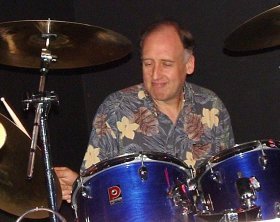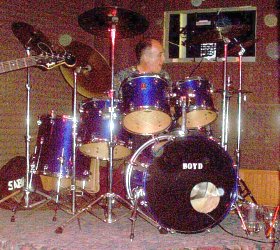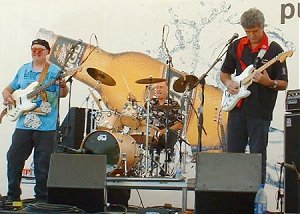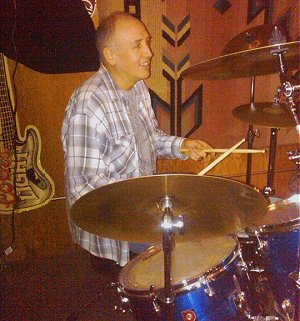| ||||||||||
| ENZYMES | TATTVAS OILS | GEM ELIXIRS | CRYSTALS | LIFESTYLE PRODUCTS | BLOG |
|
What I've Learned about Life from Drumming in a Band
by Boyd Martin
I do also enjoy participating in drum circles, ritual drumming, playing hand drums solo, or just tapping or banging on stuff (much to the chagrin of an ex-wife, and my mom); but where I get the most enjoyment is playing the drum kit in a band. And I've been very fortunate to have played music with hundreds of wonderful local, regional and national level artists, and have been in some great bands with professionals I admired and loved over the years. I think the reason I've had such great band experiences is because I just love drumming so much, and I really enjoy being in a band. For me, I've learned some of the most valuable things in my life from being in that situation--some easy and some hard: hard because of too much ego, and easy in the absence of it. Drumming in a band for me is a metaphor for every other activity I do as a group member, be it as an employee of a company, an entreprenuer, a management team, a husband, a son. All of these situations have been informed by what I've learned drumming. Here in a nutshell is some of what I've learned.
1. Play the song, not just your instrument. Play the song, not just your instrument
When drums are approached as a tool to build a song from, each drum beat, every fill, and feel, goes to expressing the song in its highest form. Too much playing, or not enough playing, as well as how the playing sets up different portions of the song, are all crucial factors. Immature drummers will sometimes play a complicated fill just because they can, not necessarily because the song calls for it (been guilty of that one!). In life, if your highest priority is to "be heard," or "proving yourself," chances are you'll be sent to the sidelines pretty quickly. In a group, the purpose and the mission must take precedence over singular individual desires and priorities. So many times, group members with personal power issues try to inflict their insecurities on the group as some sort of self-justification or self-gratification. None of this helps further the group intention, and usually leads to a political purge one way or another. Listen, react, co-create Hand-in-hand with playing the song, is being able to hear the song--hear the individual parts, and hear your part in it. This is how the music evolves in a band. Usually, especially with original compositions, what the band starts out performing for the song is not what's happening after several months' worth of gigs. This is because the band members hear better and better ways to get the song across, and endeavor to reach those ways. To me, this is at the core of why playing music is so interesting and so joyful. Every member has a crucial role to play, and every member is hearing what they can do to improve their contribution in the creation of a song. Each member is listening to the others to find ways to complement them towards the ultimate expression of the song. It is a deeply fullfilling experience to do so. I believe this stridently demonstrates human architecture--that there is so much joy experienced building something as a group, it's got to be hard-wired in the DNA. We've all seen group members who don't listen, don't react, and refuse to co-create. They don't remain group members for long. Relax and breathe Drumming is a pretty physical activity, and I learned early on that the quickest route to injury is to tense up and hold your breath. I've had carpal tunnel, shoulder bursitis, sciatica flareups, lower back pain, neck pain, hand pain, etc., etc., that would go away as long as I relaxed and breathed. Yoga also saved me many times, but only because I realized I wasn't relaxed and wasn't breathing when I played drums. By relaxing, you allow the rhythm and groove of the music to move through you--just like dancing. And it is virtually impossible to relax if you're not breathing. Nowadays, if I'm tense before playing drums, I'm certainly not after--because I've gotten in the habit of breathing and relaxing while performing, so I don't get tired because there is no effort involved in the activity. Not to say that some drumming isn't a great cardiovascular workout, it is, but as long as there is what I call dynamic relaxation, the possibility of musculo-skeletal injury is greatly reduced. This is such a metaphor on so many levels. It has to do with trust, confidence, and self-respect. Trust because you trust yourself to know what to do; confidence because you know what you do is more often than not, the right thing for the greatest number; and self-respect because you aren't punishing yourself for anything, or having frustrations about how you're doing or who you are. This last one has always been a biggy for me, particularly as a musician. But I found that if I am not sure about a drum part, it's always best to not go there--play what it is you feel great about, and leave the uncertainties out of the performance. In that way, you can build confidence knowing that everything you do, you were certain of. Have fun
But I've also known "seriously good artists" who are completely joyful when it comes to playing their music. And these are the guys who seem to have the most success. Well, whatdya know... Nothing puts the kabosh on good band performance faster than one or more members who are being moody, serious, or glum. Playing music is inherently a joyful activity, so to not approach it that way, is really pointless and has to be considered a personal power issue. Additionally, creativity only expands in joy, and is reduced to a tedious display of technique in the lower emotions. Musically speaking, if the band isn't having fun, neither is the audience. So joy as well as gloom is contagious when it comes to any performing art; let alone just group activities in general. Worship the "one" The "one" is the first beat of a musical measure. It is the most important beat because all the band members use the one as a cue. A drummer with a "weak one" weakens the entire band, leading to uncertainty, self-consciousness, and frustration. If the drummer did nothing else but play the one, the band would still sound like a band. In rock and roll (and other forms using primarily 4 beats per measure), there's such a thing as a "back beat." This is the next beat after the one and the three count (the "2" and "4"), and rock and roll is rock and roll because of it. But, it fully depends on the ONE to be there to make it strong. This is a great metaphor for "getting off on the right foot" in life. If your first move is done with confidence, authority and is of clear intent, the rest falls in line much more easily. Responsibility is established and personal power is enhanced, which leads to good leadership and everyone "being on the same page." Know your limits and stick to what you do well
If expectations can be set beforehand, disappointments are minimized for weaknesses, and strengths can be arranged for. So it is imperative to come into a new band situation completely transparent. Let your musical skills speak for themselves, and don't claim to or give the impression that you have skills you don't. I make a point of setting expectations as truthfully as I can in a new situation. If they ask me what my drumming approach is, I usually say, "I'm a groove drummer who listens and likes to play the song." That way, they're not expecting a chops wizard, and are reassured that here's a team player, mostly interested in the music. This is not to say I don't try to improve my skills, but I have found that the motivation to improve is predicated on how much a certain skill will increase my joy as a band member. If I don't see a reward from practicing, I won't practice. And there is really nothing wrong with that viewpoint (although I used to think there was), because it is truthful and doesn't minimize what you are already good at, plus, practicing for practice's sake is a waste of time. One of the musical situations I most enjoy is hitting a gig cold, where I don't know what is going to happen, and there's been a minimum of preparation (or none). The gig depends completely on my own confidence, skill level, experience and ability to listen and react. I've done gigs like that in front of thousands of people, and many times the most magical things happen because no one has any creative expectations (other than avoiding humiliation). I also fully enjoy recording in a studio because it's an opportunity to reach down deep and pull out the very best performance--and that doesn't just mean with your instrument. It also primarily means playing as a band member to the very highest of your ability. When you feel you've done that, it's a wonderful feeling knowing that band performance is now preserved forever. So... I hear the beat of the drum as the beat of my heart, and the beat of all the rhythms of life. It puts me fully in touch with how the present NOW is truly a dance to the universal music of life.
RECOMMENDED PRODUCTS:
|



 I always say that drumming is my favorite thing to do, and I've been very lucky (as well as enough of a maniac) to do it professionally for over 25 years. I've travelled the world because of it, and have made most of my closest friendships around it. I have most of my joyful moments doing it, and have been healed and transformed in so many ways by drumming.
I always say that drumming is my favorite thing to do, and I've been very lucky (as well as enough of a maniac) to do it professionally for over 25 years. I've travelled the world because of it, and have made most of my closest friendships around it. I have most of my joyful moments doing it, and have been healed and transformed in so many ways by drumming.
 For a long time, I thought this just applied to forms of music with strict song structures, such as rock, blues, or country; not applying so much to more free form styles of jazz. But I came to believe that "playing the song" is true in any form of music, because music IS song, not just noise. Of course, there is a genre of music actually called "noise", but beneath that is the challenge of listening to noise to appreciate it as music--in other words, melody, cadence, and emotional content. But my favorite kinds of music fall in the most traditional sense of music with blues and rock and all the sub-genres within.
For a long time, I thought this just applied to forms of music with strict song structures, such as rock, blues, or country; not applying so much to more free form styles of jazz. But I came to believe that "playing the song" is true in any form of music, because music IS song, not just noise. Of course, there is a genre of music actually called "noise", but beneath that is the challenge of listening to noise to appreciate it as music--in other words, melody, cadence, and emotional content. But my favorite kinds of music fall in the most traditional sense of music with blues and rock and all the sub-genres within.
 I've known so many "serious artists." Those who are so wrapped up in their insecure ego expressions that they just can't have fun. If you take yourself too seriously, there is no fun in it. You also set youself up for others to have fun at your expense.
I've known so many "serious artists." Those who are so wrapped up in their insecure ego expressions that they just can't have fun. If you take yourself too seriously, there is no fun in it. You also set youself up for others to have fun at your expense.
 "I do what I do and get hired because of it," said one my drum mentors. His point was that he is not pretending to be or do anything other than what he does. This speaks not only to consistency, but to personal style and how predictable you are in a group setting. It's the "hat" you wear as a group member, or as a type of drummer. Although culturally, we give lip service to not limiting anyone's style, when it comes down to accomplishing something in a group the more that is known about a member's strengths and weaknesses the better.
"I do what I do and get hired because of it," said one my drum mentors. His point was that he is not pretending to be or do anything other than what he does. This speaks not only to consistency, but to personal style and how predictable you are in a group setting. It's the "hat" you wear as a group member, or as a type of drummer. Although culturally, we give lip service to not limiting anyone's style, when it comes down to accomplishing something in a group the more that is known about a member's strengths and weaknesses the better.